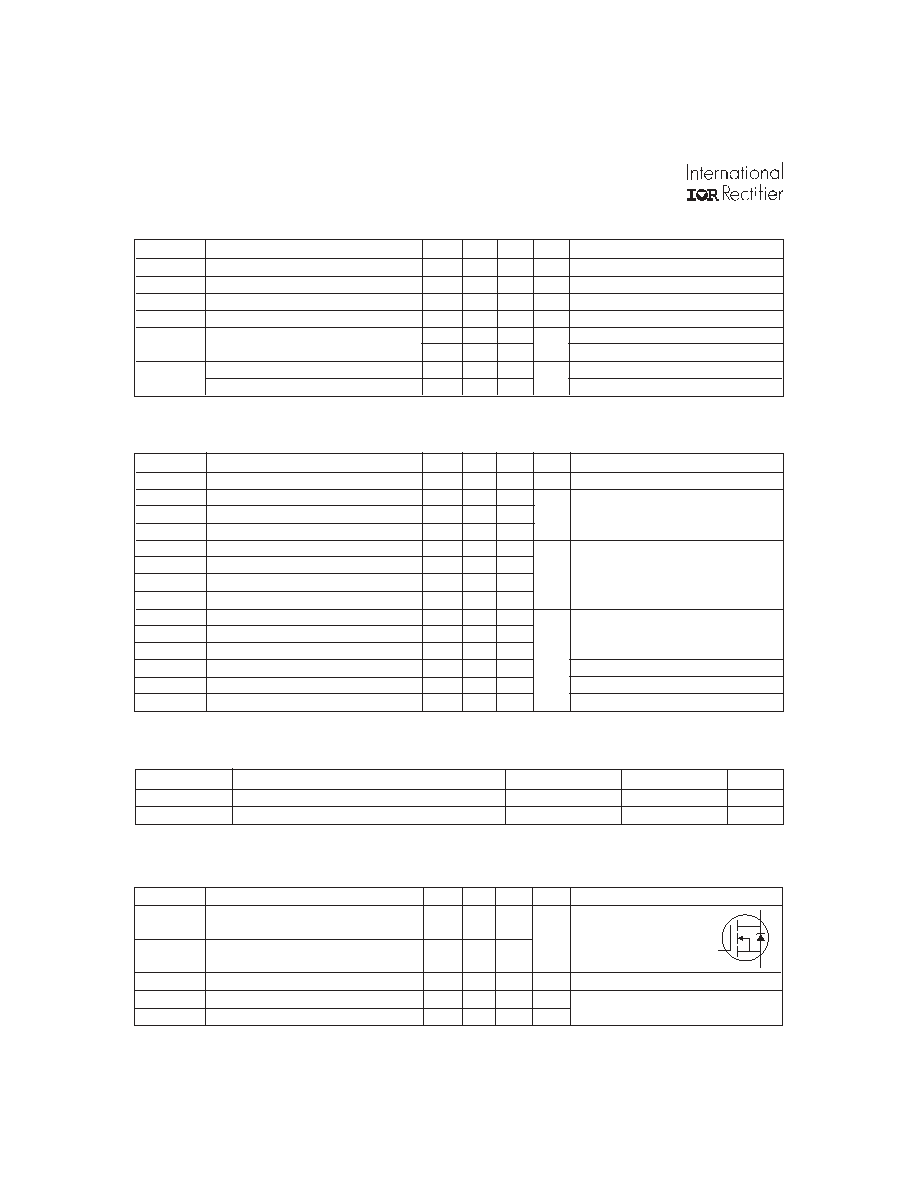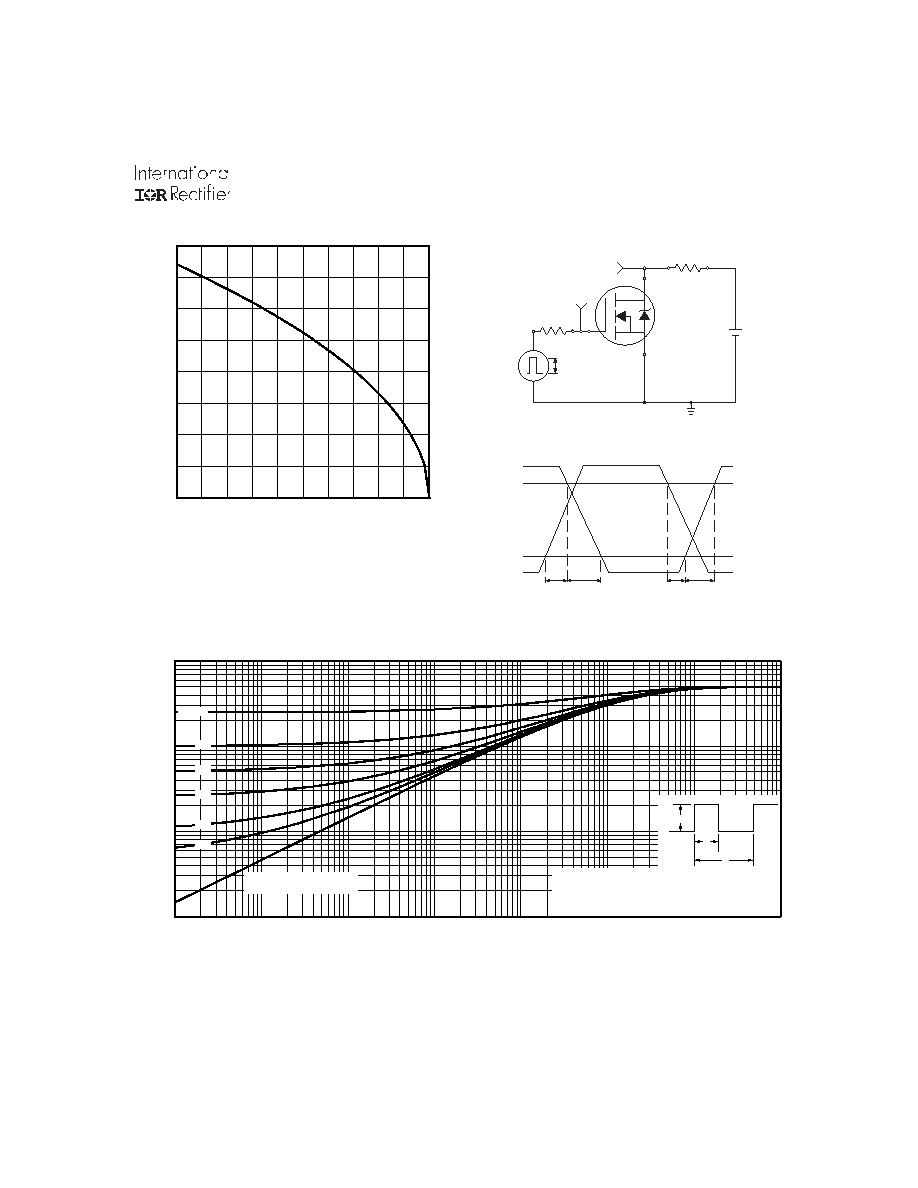
www.irf.com
1
IRF7492
HEXFET
®
Power MOSFET
l
High frequency DC-DC converters
Benefits
Applications
l
Low Gate to Drain Charge to Reduce
Switching Losses
l
Fully Characterized Capacitance Including
Effective C
OSS
to Simplify Design, (See
App. Note AN1001)
l
Fully Characterized Avalanche Voltage
and Current
Parameter
Max.
Units
V
DS
Drain-Source Voltage
200
V
V
GS
Gate-to-Source Voltage
± 20
V
I
D
@ T
A
= 25°C
Continuous Drain Current, V
GS
@ 10V
3.7
I
D
@ T
A
= 70°C
Continuous Drain Current, V
GS
@ 10V
3.0
A
I
DM
Pulsed Drain Current
30
P
D
@T
A
= 25°C
Power Dissipation
2.5
W
Linear Derating Factor
0.02
W/°C
dv/dt
Peak Diode Recovery dv/dt
9.5
V/ns
T
J
Operating Junction and
-55 to + 150
T
STG
Storage Temperature Range
°C
Soldering Temperature, for 10 seconds
300 (1.6mm from case )
Absolute Maximum Ratings
Notes
through
are on page 8
PD - 94498
SO-8
T o p V ie w
8
1
2
3
4
5
6
7
D
D
D
D
G
S
A
S
S
A
V
DSS
R
DS(on)
max
I
D
200V
79
m
@V
GS
= 10V
3.7A
Symbol
Parameter
Typ.
Max.
Units
R
JL
Junction-to-Drain Lead
20
R
JA
Junction-to-Ambient
50
Thermal Resistance
06/27/02
°C/W

IRF7492
2
www.irf.com
Parameter
Min. Typ. Max. Units
Conditions
g
fs
Forward Transconductance
7.9
S
V
DS
= 50V, I
D
= 3.7A
Q
g
Total Gate Charge
39
59
I
D
= 2.2A
Q
gs
Gate-to-Source Charge
9.2
nC
V
DS
= 100V
Q
gd
Gate-to-Drain ("Miller") Charge
15
V
GS
= 10V
t
d(on)
Turn-On Delay Time
15
V
DD
= 100V
t
r
Rise Time
13
I
D
= 2.2A
t
d(off)
Turn-Off Delay Time
27
R
G
= 6.5
t
f
Fall Time
14
V
GS
= 10V
C
iss
Input Capacitance
1820
V
GS
= 0V
C
oss
Output Capacitance
190
V
DS
= 25V
C
rss
Reverse Transfer Capacitance
94
pF
= 1.0MHz
C
oss
Output Capacitance
780
V
GS
= 0V, V
DS
= 1.0V, = 1.0MHz
C
oss
Output Capacitance
89
V
GS
= 0V, V
DS
= 160V, = 1.0MHz
C
oss
eff.
Effective Output Capacitance
150
V
GS
= 0V, V
DS
= 0V to 160V
Dynamic @ T
J
= 25°C (unless otherwise specified)
ns
Parameter
Typ.
Max.
Units
E
AS
Single Pulse Avalanche Energy
130
mJ
I
AR
Avalanche Current
4.4
A
Avalanche Characteristics
S
D
G
Parameter
Min. Typ. Max. Units
Conditions
I
S
Continuous Source Current
MOSFET symbol
(Body Diode)
showing the
I
SM
Pulsed Source Current
integral reverse
(Body Diode)
p-n junction diode.
V
SD
Diode Forward Voltage
1.3
V
T
J
= 25°C, I
S
= 2.2A, V
GS
= 0V
t
rr
Reverse Recovery Time
69
100
ns
T
J
= 25°C, I
F
= 2.2A
Q
rr
Reverse RecoveryCharge
200
310
nC
di/dt = 100A/µs
Diode Characteristics
2.3
30
A
Static @ T
J
= 25°C (unless otherwise specified)
Parameter
Min. Typ. Max. Units
Conditions
BV
(BR)DSS
Drain-to-Source Breakdown Voltage
200
V
V
GS
= 0V, I
D
= 250µA
V
(BR)DSS
/
T
J
Breakdown Voltage Temp. Coefficient
0.20 V/°C Reference to 25°C, I
D
= 1mA
R
DS(on)
Static Drain-to-Source On-Resistance
64
79
m
V
GS
= 10V, I
D
= 2.2A
V
GS(th)
Gate Threshold Voltage
2.5
V
V
DS
= V
GS
, I
D
= 250µA
1.0
µA
V
DS
= 160V, V
GS
= 0V
250
V
DS
= 160V, V
GS
= 0V, T
J
= 125°C
Gate-to-Source Forward Leakage
100
V
GS
= 20V
Gate-to-Source Reverse Leakage
-100
nA
V
GS
= -20V
I
GSS
I
DSS
Drain-to-Source Leakage Current

IRF7492
www.irf.com
3
Fig 2. Typical Output Characteristics
Fig 1. Typical Output Characteristics
Fig 3. Typical Transfer Characteristics
Fig 4. Normalized On-Resistance
Vs. Temperature
0.1
1
10
100
1000
VDS, Drain-to-Source Voltage (V)
0.001
0.01
0.1
1
10
100
I D
, Drain-to-Source Current (A)
5.5V
20µs PULSE WIDTH
Tj = 25°C
VGS
TOP
15V
12V
10V
8.0V
7.0V
6.5V
6.0V
BOTTOM
5.5V
0.1
1
10
100
1000
VDS, Drain-to-Source Voltage (V)
0.1
1
10
100
I D
, Drain-to-Source Current (A)
5.5V
20µs PULSE WIDTH
Tj = 150°C
VGS
TOP
15V
12V
10V
8.0V
7.0V
6.5V
6.0V
BOTTOM
5.5V
4.0
5.0
6.0
7.0
8.0
VGS, Gate-to-Source Voltage (V)
0.10
1.00
10.00
100.00
I D
, Drain-to-Source Current
(
)
TJ = 25°C
TJ = 150°C
VDS = 50V
20µs PULSE WIDTH
-60
-40
-20
0
20
40
60
80
100
120
140
160
0.0
0.5
1.0
1.5
2.0
2.5
3.0
V
=
I
=
GS
D
10V
3.7A
Tj, Junction Temperature (
°
C)
R
DS(on)
, Drain-to-Source On Resistance
(Normalized)

IRF7492
4
www.irf.com
Fig 6. Typical Gate Charge Vs.
Gate-to-Source Voltage
Fig 5. Typical Capacitance Vs.
Drain-to-Source Voltage
Fig 7. Typical Source-Drain Diode
Forward Voltage
0.1
1
10
100
0.2
0.4
0.6
0.8
1.0
V ,Source-to-Drain Voltage (V)
I , Reverse Drain Current (A)
SD
SD
V = 0 V
GS
T = 150 C
J
°
T = 25 C
J
°
Fig 8. Maximum Safe Operating Area
1
10
100
1000
VDS, Drain-to-Source Voltage (V)
10
100
1000
10000
100000
C, Capacitance(pF)
VGS = 0V, f = 1 MHZ
Ciss = Cgs + Cgd, Cds SHORTED
Crss = Cgd
Coss = Cds + Cgd
Coss
Crss
Ciss
0
10
20
30
40
50
QG Total Gate Charge (nC)
0
2
4
6
8
10
12
V
GS
, Gate-to-Source Voltage (V)
VDS= 160V
VDS= 100V
VDS= 40V
ID= 2.2A
1
10
100
1000
VDS, Drain-to-Source Voltage (V)
0.1
1
10
100
I D
, Drain-to-Source Current (A)
Tc = 25°C
Tj = 150°C
Single Pulse
1msec
10msec
OPERATION IN THIS AREA
LIMITED BY RDS(on)
100µsec

IRF7492
www.irf.com
5
Fig 11. Maximum Effective Transient Thermal Impedance, Junction-to-Case
0.1
1
10
100
0.0001
0.001
0.01
0.1
1
10
100
1000
Notes:
1. Duty factor D =
t / t
2. Peak T
= P
x Z
+ T
1
2
J
DM
thJA
A
P
t
t
DM
1
2
t , Rectangular Pulse Duration (sec)
Thermal Response
(Z )
1
thJA
0.01
0.02
0.05
0.10
0.20
D = 0.50
SINGLE PULSE
(THERMAL RESPONSE)
Fig 10a. Switching Time Test Circuit
V
DS
90%
10%
V
GS
t
d(on)
t
r
t
d(off)
t
f
Fig 10b. Switching Time Waveforms
V
DS
Pulse Width
1
µs
Duty Factor
0.1 %
R
D
V
GS
R
G
D.U.T.
10V
+
-
V
DD
25
50
75
100
125
150
0.0
1.0
2.0
3.0
4.0
I , Drain Current (A)
D
Fig 9. Maximum Drain Current Vs.
Ambient Temperature
T
A
, Ambient Temperature (°C)




